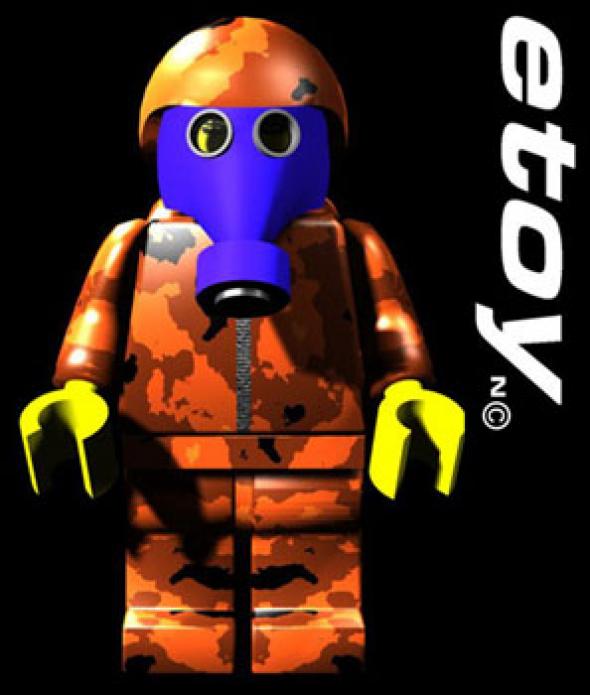Do As They Do, Not As They Do
All work and all play make Toywar soldiers' day! Josephine Berry on etoy and eToys' legal tussle in the symbolic economy.
Last November 29th, US online toy retailer eToys brought a suit against the European net art collective etoy, blocking them from using their own domain name www.etoy.com — registered two years before eToys even existed — in a clear cut case of corporate might and spite, not to mention greed. The closeness of ‘etoy.com’ to the retailer’s own URL www.etoys.com, argued every kiddy’s favourite corporation, was confusing customers who also risked being exposed to pornographic and violent (a.k.a. European and arty) content. eToys played heavily on the family values card to secure a preliminary US court ruling in their favour. Not surprisingly, this action elicited torrents of vitriol from etoy fans and the Reclaim the Domain Name System lobby alike. Quite a lot more surprising, however, given the hotness of the DNS topic right now, was the professionalism and commitment accomplished by Toywar — etoy’s name for its resistance campaign and website www.toywar.com — whose antics finally secured eToys’s total climb down as they watched their shares plunge by 70rom $67 to $20 a share. In what has been described as "the Brent-Spar of e-commerce", eToys dropped the case ‘without prejudice’ on January 25th (i.e. withholding the option to resume proceedings again) and agreed to pay etoy’s court costs of $40,000. There is no doubt that this has been a landmark victory in the crucial battle over Domain Names and an inspiringly unorthodox example of ‘dispute resolution’.
But hold on, did I say ‘professionalism’ and ‘commitment’ just now? Wouldn’t those words look more at home in a go-gettin’ corporate presentation? Precisely the trick. etoy was itself, as Douglas Rushkoff recently put it, intended "both as a satire of the corporate value system and a barometer of the information space." If power is corporate and global, argue etoy, then art should be too. The etoy campaign is replete with both metaphors and strategies lifted straight out of the corporate world. Potential recruits are incited to "HELP US PROTECT THE etoy.BRAND AND BECOME A SHAREHOLDER!". Partisan efforts are rewarded with loyalty points corresponding to ‘etoy.SHARES’ in the ‘etoy.ART-BRAND’. In a press release their spokesman, Zai, informs us that "investors keep etoy alive. They invest into the future of Internet art." Indeed, US based activist art group RTMark’s decision to award etoy ‘sabotage project funding’ could effectively be seen in terms of a joint venture. Not only are individual art groups adopting the walk and talk of the corporate world, but they’re even corporatising amongst themselves; sharing resources and databases, and piggybacking on each another’s brand value.
Could it be that etoy’s use of shares and markets effectively extends the modernist game of turning the conditions of the artwork’s making into the subject of the artwork itself (e.g. turning the canvas into the subject of the work) to the immaterial realm of financial markets? In other words, is the market really becoming more than just the subject of the art? Is it becoming subject and support (of the signifier) in one? Is an etoy.SHARE an actual share and its metaphor at the same time? Before ‘speculating’ on this any further, it should be mentioned that the role played by the Toywar in the free-fall of eToy’s shares is greatly contested. The FT’s view is reassuringly prosaic, blaming eToy’s humpty-dumpty antics on "the cost of tripling its customer base over the christmas holidays" amongst other things.
Etoy’s own line on the status of their share system masquerades behind an equally neutralising and predictable language: that of art history. Commenting on the possible illegality (within the US legal system) of issuing ‘etoy.SHARES’, they neatly side-step the whole modernist trajectory mentioned above. Insisting on the docility of the signified, they claim: "we never sold a share to a person who did not know that this is an ‘ART INVESTMENT’ ... according to international lawyers and advisors the word ‘share’ is not limited or registered for the use in financial markets! If artists can call art products ‘landscape XY’, ‘naked body blabla’ or ‘the death’ …we insist on the right to call our work etoy.SHARE... because value systems, stock markets and the surreal etoy.CORPORATION are our TOPICS!" So if an ETOY.share is not literally a share but can nonetheless be bought, acquired and exchanged, what is it? If etoy is not really a corporation but is nonetheless, at their own insistence, involved in effecting fluctuations in the market value of another company, their ‘rival brand’ so to speak, what is the art work’s relationship to its signified?
Surely what art risks when pastiche tips over into market manipulations and legal victories is the loss of the very thing that distinguishes it from its satirical victim: its own autonomy. Perhaps this sounds like an apology for a discredited ideal of disinterested art or ineffectual art, but it’s hard not to feel that etoy’s albeit ludic and PC deployment of markets isn’t achieving a too perfect symmetry with its dark other.
Josephine Berry <josieATmetamute.com>
Mute Books Orders
For Mute Books distribution contact Anagram Books
contact@anagrambooks.com
For online purchases visit anagrambooks.com








